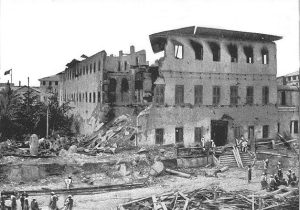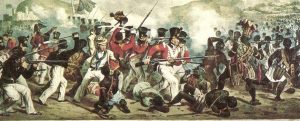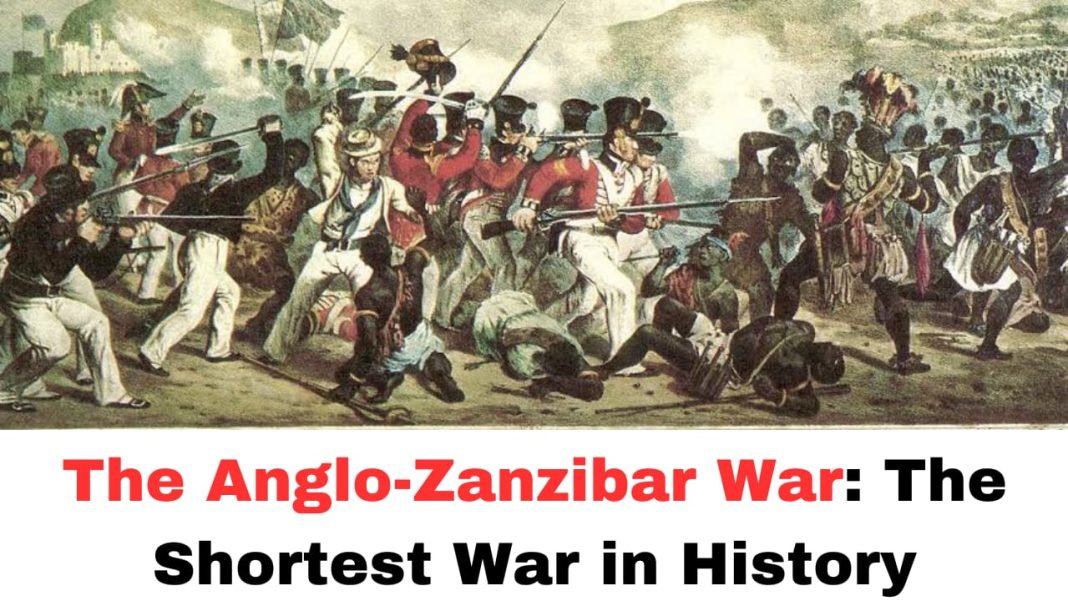Digital News Guru History Desk:
The Anglo-Zanzibar War, fought on August 27, 1896, is often remembered as the shortest war in history, lasting between 38 and 45 minutes. This brief but intense conflict between the United Kingdom and the Sultanate of Zanzibar remains a fascinating episode in the annals of colonial history, offering a glimpse into the imperial power dynamics of the late 19th century and the far-reaching consequences of European domination in Africa.
Background: The Political Landscape of Zanzibar
Zanzibar, an island off the coast of East Africa, had long been a major center of trade, particularly in spices and slaves, before becoming a part of the British Empire’s influence in the late 19th century. The island had been ruled by the Sultanate of Zanzibar, a wealthy and powerful dynasty that was heavily involved in the Indian Ocean trade. By the 1880s, Zanzibar became a protectorate of the British Empire, with Britain asserting control over the island’s foreign affairs, while Zanzibar retained nominal sovereignty.

In the years leading up to the war, Zanzibar’s political landscape was increasingly shaped by British interests. The British were keen on maintaining their dominance in East Africa, particularly to safeguard their routes to India and to control key trade networks. However, Zanzibar remained semi-autonomous, with the Sultan of Zanzibar having significant authority within the sultanate. The sultan’s control was not absolute, though, as Britain had considerable influence over the sultan’s decisions, especially concerning foreign policy and military matters.
The Coup and the Prelude to War
The Anglo-Zanzibar War was triggered by a political crisis that occurred on August 25, 1896, when Sultan Hamad bin Thuwaini, who had been sympathetic to British interests, died unexpectedly. Following his death, his cousin, Khalid bin Barghash, seized the throne without British approval, despite the fact that the British favored Sultan Hamoud bin Mohammed, a more compliant candidate.
Khalid’s assumption of power angered the British, who viewed him as a potential obstacle to their influence in the region. The British authorities issued an ultimatum demanding that Khalid step down and leave the palace, warning that if he did not comply, they would take military action. Khalid, however, refused to back down, and the stage was set for conflict.
The British Response
The British had a substantial military presence in Zanzibar. The British forces, led by Admiral Percy Scott, included a combination of naval ships and ground troops, along with a small number of indigenous forces loyal to the British. The British forces were well-equipped, with a fleet of warships positioned in the harbor. These ships included the HMS St. George, the HMS Racoon, and the HMS Sparrow, all of which were armed with modern artillery capable of destroying the palace and its defenses.
On the other side, Sultan Khalid’s forces were vastly inferior. Although he commanded around 2,800 men, including soldiers and a militia, their equipment was outdated, and they had only a few small artillery pieces. They were also poorly trained compared to the British forces.
The British government gave Khalid an ultimatum to stand down, which he refused. This led to the British forces beginning their bombardment at precisely 9:02 AM on August 27, 1896.
The Anglo-Zanzibar War Begins: A Brief but Intense Conflict
At 9:02 AM, the British began a bombardment of the Sultan’s palace and military positions. The British warships fired heavy artillery, which immediately disabled Zanzibar’s military defenses. The palace, where Sultan Khalid had taken refuge, was heavily shelled, and the nearby military positions were quickly neutralized.

Khalid’s forces fired back with what little artillery they had, but their efforts were largely ineffectual. Despite the size of the Sultan’s military, they were no match for the firepower of the British navy. The bombardment continued for around 38 minutes before the Sultan’s forces were completely defeated. By 9:40 AM, the British had effectively won the war.
Khalid himself managed to escape from the palace and sought refuge in the German consulate, but he was eventually captured and exiled. The Sultan’s palace, along with several other buildings, was destroyed during the bombardment, and the damage to Zanzibar’s military infrastructure was severe. Despite Khalid’s brief resistance, his forces were unable to mount an effective defense, and the war ended as quickly as it had begun.
Casualties and Destruction
The British casualties were minimal, with only one British sailor reported to have been injured during the bombardment. In contrast, Zanzibar’s losses were far more significant. Around 40 to 100 Zanzibari soldiers and civilians were killed during the brief conflict, and many more were wounded. The city of Zanzibar itself suffered considerable destruction, particularly the palace and the surrounding areas.
The war’s brevity has led many historians to marvel at the sheer disparity in military power between the two sides. The British forces had far superior technology, weaponry, and experience, and their victory was inevitable given the circumstances.
Aftermath: British Control Over Zanzibar
Following the conflict, the British immediately installed Sultan Hamoud bin Mohammed as the new ruler of Zanzibar. Sultan Hamoud, who was sympathetic to British interests, was effectively a puppet ruler, and his reign marked the beginning of more direct British control over Zanzibar. While the Sultanate retained its title, its independence was increasingly undermined by British colonial influence.
Sultan Khalid, after fleeing the palace, was captured by the British and exiled to the island of Seychelles, where he lived out the remainder of his life in relative obscurity.
Zanzibar would remain a British protectorate until it gained independence in 1963. In 1964, Zanzibar merged with Tanganyika (now Tanzania) to form the modern state of Tanzania.
Legacy: The Shortest War in History
The Anglo-Zanzibar War remains a symbol of the absurdities of imperialism. Its sheer brevity—lasting less than an hour—makes it a historical anomaly and has earned it the title of the “shortest war in history.” The war is often cited as an example of the overwhelming military advantage enjoyed by European powers over their colonial subjects during the height of the imperial era.

Despite its quick conclusion, the war had significant political consequences for Zanzibar and for East Africa as a whole. It reinforced British control over the region and marked the beginning of the end for Zanzibar’s political autonomy. However, the legacy of the conflict also stands as a reminder of the unequal power dynamics that defined much of the colonial era.
The Anglo-Zanzibar War continues to be a subject of fascination for historians, military enthusiasts, and those interested in the history of colonialism. It serves as a brief yet poignant reminder of the impact of European imperialism on African nations and the absurdity of some conflicts in the age of colonial expansion.
You May Also Read: Sambhal Shahi Jama Masjid Chief Taken into Custody: A Detailed Report








